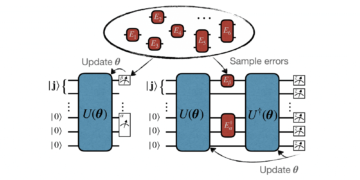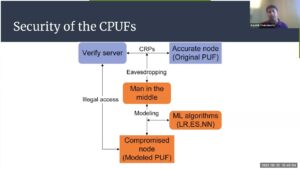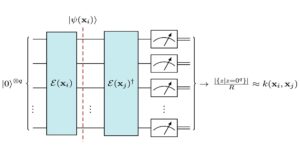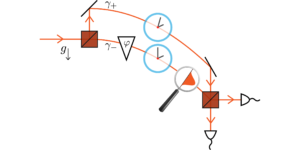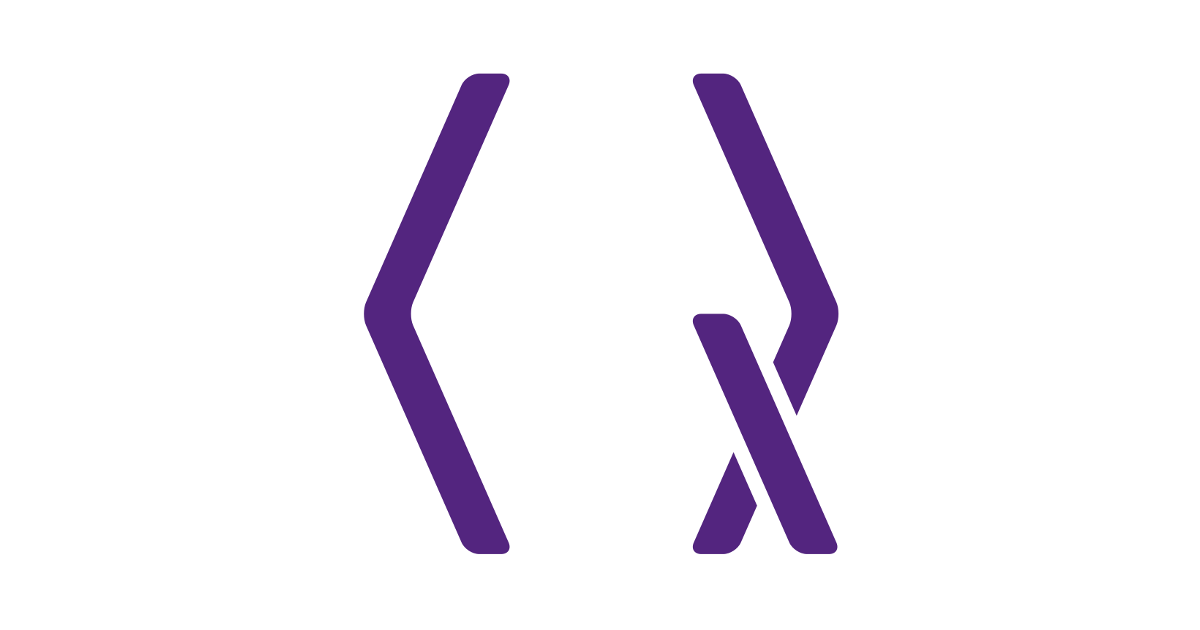
1IBM Quantum, MIT-IBM Watson AI Lab, Cambridge, Massachusetts 02142, USA
2Department of Computer Science and Engineering, Pennsylvania State University
3IBM Quantum, Thomas J Watson Research Center, Yorktown Heights, New York 10598, USA
Find this paper interesting or want to discuss? Scite or leave a comment on SciRate.
Abstract
A promising avenue for the preparation of Gibbs states on a quantum computer is to simulate the physical thermalization process. The Davies generator describes the dynamics of an open quantum system that is in contact with a heat bath. Crucially, it does not require simulation of the heat bath itself, only the system we hope to thermalize. Using the state-of-the-art techniques for quantum simulation of the Lindblad equation, we devise a technique for the preparation of Gibbs states via thermalization as specified by the Davies generator.
In doing so, we encounter a severe technical challenge: implementation of the Davies generator demands the ability to estimate the energy of the system unambiguously. That is, each energy of the system must be deterministically mapped to a unique estimate. Previous work showed that this is only possible if the system satisfies an unphysical ’rounding promise’ assumption. We solve this problem by engineering a random ensemble of rounding promises that simultaneously solves three problems: First, each rounding promise admits preparation of a ‘promised’ thermal state via a Davies generator. Second, these Davies generators have a similar mixing time as the ideal Davies generator. Third, the average of these promised thermal states approximates the ideal thermal state.
► BibTeX data
► References
[1] Álvaro M Alhambra. Quantum many-body systems in thermal equilibrium. arXiv:2204.08349, 2022.
https://doi.org/10.48550/arXiv.2204.08349
arXiv:2204.08349
[2] Sergey Bravyi, Anirban Chowdhury, David Gosset, and Pawel Wocjan. On the complexity of quantum partition functions. arXiv:2110.15466, 2021.
https://doi.org/10.1038/s41567-022-01742-5
arXiv:2110.15466
[3] Fernando G. S. L. Brandão, Amir Kalev, Tongyang Li, Cedric Yen-Yu Lin, Krysta M. Svore, and Xiaodi Wu. Quantum SDP solvers: Large speed-ups, optimality, and applications to quantum learning. In 46th International Colloquium on Automata, Languages, and Programming (ICALP 2017), volume 132, page 27, 2019.
https://doi.org/10.4230/LIPIcs.ICALP.2019.27
[4] Heinz-Peter Breuer and Francesco Petruccione. The Theory of Open Quantum Systems. Oxford University Press, 2002.
https://doi.org/10.1093/acprof:oso/9780199213900.001.0001
[5] Chi-Fang Chen and Fernando GSL Brandão. Fast thermalization from the eigenstate thermalization hypothesis. arXiv:2112.07646, 2021.
https://doi.org/10.48550/arXiv.2112.07646
arXiv:2112.07646
[6] Chi-Fang Chen, Michael J. Kastoryano, Fernando G. S. L. Brandão, and András Gilyén. Quantum thermal state preparation. arXiv:2303.18224, 2023.
https://doi.org/10.48550/arXiv.2212.02051
arXiv:2303.18224
[7] Anirban Narayan Chowdhury and Rolando D Somma. Quantum algorithms for Gibbs sampling and hitting-time estimation. Quantum Information & Computation, 17(1-2):41–64, 2017.
https://doi.org/10.26421/QIC17.1-2-3
[8] Richard Cleve and Chunhao Wang. Efficient quantum algorithms for simulating Lindblad evolution. arXiv:1612.09512 Proceedings of the 44th International Colloquium on Automata, Languages, and Programming (ICALP 2017), 2017.
https://doi.org/10.48550/arXiv.1612.09512
arXiv:1612.09512
[9] Edward Brian Davies. Quantum Theory of Open Systems. Academic Press, 1976.
[10] Edward Brian Davies. Generators of dynamical semigroups. Journal of Functional Analysis, 34(3):421–432, 1979.
https://doi.org/10.1016/0022-1236(79)90085-5
[11] András Gilyén, Yuan Su, Guang Hao Low, and Nathan Wiebe. Quantum singular value transformation and beyond: exponential improvements for quantum matrix arithmetics. In Proceedings of the 51st Annual ACM SIGACT Symposium on Theory of Computing (STOC 2019), pages 193–204, 2019.
https://doi.org/10.1145/3313276.3316366
[12] Zoe Holmes, Gopikrishnan Muraleedharan, Rolando D. Somma, Yigit Subasi, and Burak Şahinoğlu. Quantum algorithms from fluctuation theorems: Thermal-state preparation. Quantum, 6:825, October 2022.
https://doi.org/10.22331/q-2022-10-06-825
[13] Mária Kieferová and Nathan Wiebe. Tomography and generative training with quantum Boltzmann machines. Physical Review A, 96(6):062327, 2017.
https://doi.org/10.1103/PhysRevA.96.062327
[14] Guang Hao Low and Isaac L Chuang. Hamiltonian simulation by uniform spectral amplification. arXiv:1707.05391, 2017.
https://doi.org/10.48550/arXiv.1707.05391
arXiv:1707.05391
[15] Goran Lindblad. On the generators of quantum dynamical semigroups. Communications in Mathematical Physics, 48(2):119–130, 1976.
https://doi.org/10.1007/BF01608499
[16] Xiantao Li and Chunhao Wang. Simulating Markovian open quantum systems using higher-order series expansion. 2212.02051, 2022.
https://doi.org/10.48550/arXiv.2212.02051
[17] John M Martyn, Zane M Rossi, Andrew K Tan, and Isaac L Chuang. Grand unification of quantum algorithms. PRX Quantum, 2(4):040203, 2021.
https://doi.org/10.1103/PRXQuantum.2.040203
[18] Davide Nigro. On the uniqueness of the steady-state solution of the Lindblad–gorini–Kossakowski–Sudarshan equation. Journal of Statistical Mechanics: Theory and Experiment, 2019(4):043202, 2019.
https://doi.org/10.1088/1742-5468/ab0c1c
[19] David Poulin and Pawel Wocjan. Sampling from the thermal quantum Gibbs state and evaluating partition functions with a quantum computer. Physical Review Letters, 103(22):220502, 2009.
https://doi.org/10.1103/PhysRevLett.103.220502
[20] Patrick Rall. Faster coherent quantum algorithms for phase, energy, and amplitude estimation. Quantum, 5:566, 2021.
https://doi.org/10.22331/q-2021-10-19-566
[21] S. Slezak and E. Crosson. Eigenstate thermalization and quantum Metropolis sampling, 2022. Presentation at QIP 2022. https://youtu.be/by4rvu7RMtY.
https://youtu.be/by4rvu7RMtY
[22] Herbert Spohn. An algebraic condition for the approach to equilibrium of an open $n$-level system. Letters in Mathematical Physics, 2(1):33–38, 1977.
https://doi.org/10.1007/BF00420668
[23] Kristan Temme, Tobias J Osborne, Karl G Vollbrecht, David Poulin, and Frank Verstraete. Quantum Metropolis sampling. Nature, 471(7336):87–90, 2011.
https://doi.org/10.1038/nature09770
[24] Joran van Apeldoorn and András Gilyén. Improvements in quantum SDP-solving with applications. In Proceedings of the 46th International Colloquium on Automata, Languages, and Programming (ICALP 2019), 2019.
https://doi.org/10.4230/LIPIcs.ICALP.2019.99
[25] Joran Van Apeldoorn, András Gilyén, Sander Gribling, and Ronald de Wolf. Quantum SDP-solvers: Better upper and lower bounds. Quantum, 4:230, 2020.
https://doi.org/10.22331/q-2020-02-14-230
[26] John Watrous. The Theory of Quantum Information. Cambridge University Press, 2018.
https://doi.org/10.5555/3240076
[27] Pawel Wocjan and Kristan Temme. Szegedy walk unitaries for quantum maps. Commun. Math. Phys., 2023.
https://doi.org/10.1007/s00220-023-04797-4
Cited by
[1] Alexander M. Dalzell, Sam McArdle, Mario Berta, Przemyslaw Bienias, Chi-Fang Chen, András Gilyén, Connor T. Hann, Michael J. Kastoryano, Emil T. Khabiboulline, Aleksander Kubica, Grant Salton, Samson Wang, and Fernando G. S. L. Brandão, “Quantum algorithms: A survey of applications and end-to-end complexities”, arXiv:2310.03011, (2023).
[2] Mirko Consiglio, “Variational Quantum Algorithms for Gibbs State Preparation”, arXiv:2305.17713, (2023).
[3] Xiantao Li and Chunhao Wang, “Simulating Markovian open quantum systems using higher-order series expansion”, arXiv:2212.02051, (2022).
[4] Chi-Fang Chen, Hsin-Yuan Huang, John Preskill, and Leo Zhou, “Local minima in quantum systems”, arXiv:2309.16596, (2023).
The above citations are from SAO/NASA ADS (last updated successfully 2023-10-13 15:50:33). The list may be incomplete as not all publishers provide suitable and complete citation data.
On Crossref’s cited-by service no data on citing works was found (last attempt 2023-10-13 15:50:31).
This Paper is published in Quantum under the Creative Commons Attribution 4.0 International (CC BY 4.0) license. Copyright remains with the original copyright holders such as the authors or their institutions.
- SEO Powered Content & PR Distribution. Get Amplified Today.
- PlatoData.Network Vertical Generative Ai. Empower Yourself. Access Here.
- PlatoAiStream. Web3 Intelligence. Knowledge Amplified. Access Here.
- PlatoESG. Carbon, CleanTech, Energy, Environment, Solar, Waste Management. Access Here.
- PlatoHealth. Biotech and Clinical Trials Intelligence. Access Here.
- Source: https://quantum-journal.org/papers/q-2023-10-10-1132/
- :is
- :not
- 001
- 1
- 10
- 11
- 12
- 13
- 14
- 15%
- 16
- 17
- 19
- 20
- 2011
- 2017
- 2018
- 2019
- 2020
- 2021
- 2022
- 2023
- 22
- 23
- 24
- 25
- 26%
- 27
- 31
- 33
- 50
- 7
- 8
- 9
- a
- ability
- above
- ABSTRACT
- academic
- access
- ACM
- affiliations
- AI
- Alexander
- algorithms
- All
- Amplification
- an
- analysis
- and
- Andrew
- annual
- applications
- approach
- approximates
- ARE
- AS
- assumption
- At
- attempt
- author
- authors
- Avenue
- average
- BE
- Better
- Beyond
- bounds
- Break
- Brian
- by
- cambridge
- Center
- challenge
- chen
- COHERENT
- comment
- Commons
- Communications
- complete
- complexities
- complexity
- computation
- computer
- computer science
- computing
- condition
- contact
- copyright
- crucially
- data
- David
- demands
- devise
- discuss
- does
- doing
- dynamics
- e
- each
- Edward
- efficient
- emil
- end-to-end
- energy
- Engineering
- Equilibrium
- estimate
- evaluating
- evolution
- expansion
- experiment
- exponential
- FAST
- faster
- First
- fluctuation
- For
- found
- frank
- from
- functional
- functions
- generative
- generator
- generators
- grand
- grant
- harvard
- Have
- heights
- holders
- hope
- HTTPS
- huang
- ideal
- if
- implementation
- improvements
- in
- information
- institutions
- interesting
- International
- IT
- itself
- JavaScript
- John
- journal
- karl
- lab
- Languages
- large
- Last
- learning
- Leave
- LEO
- Li
- License
- lin
- List
- local
- Low
- lower
- Machines
- Maps
- mario
- massachusetts
- math
- mathematical
- Matrix
- May..
- mechanics
- Michael
- Mixing
- Month
- must
- Nature
- New
- New York
- no
- Oct
- october
- of
- on
- only
- open
- or
- original
- Oxford
- oxford university
- page
- pages
- Paper
- patrick
- Pennsylvania
- phase
- physical
- Physics
- plato
- Plato Data Intelligence
- PlatoData
- possible
- preparation
- presentation
- press
- previous
- Problem
- problems
- Proceedings
- process
- Programming
- promise
- promised
- promises
- promising
- provide
- published
- publisher
- publishers
- Quantum
- quantum algorithms
- Quantum Computer
- quantum information
- quantum systems
- random
- references
- remains
- require
- research
- review
- Richard
- rounding
- s
- Sam
- SC22
- Science
- SDP
- Second
- Series
- severe
- showed
- similar
- simulation
- simultaneously
- singular
- So
- solution
- SOLVE
- Solves
- specified
- Spectral
- State
- state-of-the-art
- States
- statistical
- Successfully
- such
- suitable
- Survey
- Symposium
- system
- Systems
- Technical
- technique
- techniques
- that
- The
- their
- theory
- thermal
- These
- Third
- this
- three
- time
- Title
- to
- Training
- Transformation
- under
- unique
- uniqueness
- university
- updated
- URL
- using
- value
- via
- vollbrecht
- volume
- walk
- want
- was
- Watson
- we
- with
- Wolf
- Work
- works
- wu
- year
- york
- Yuan
- zephyrnet





